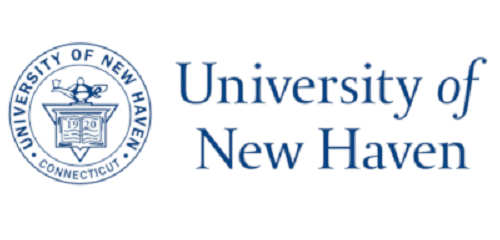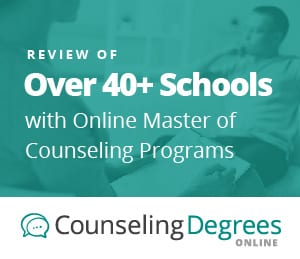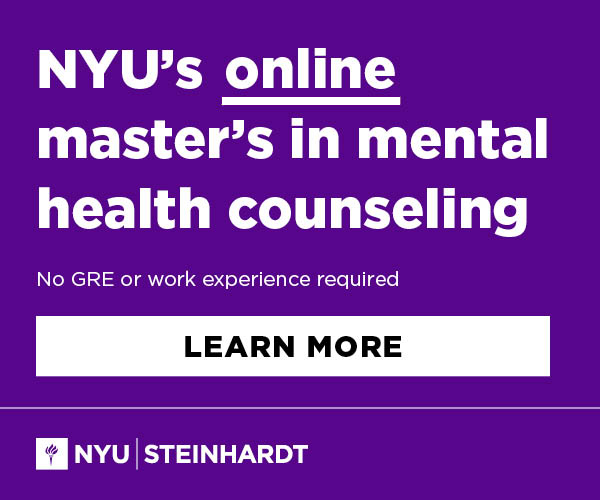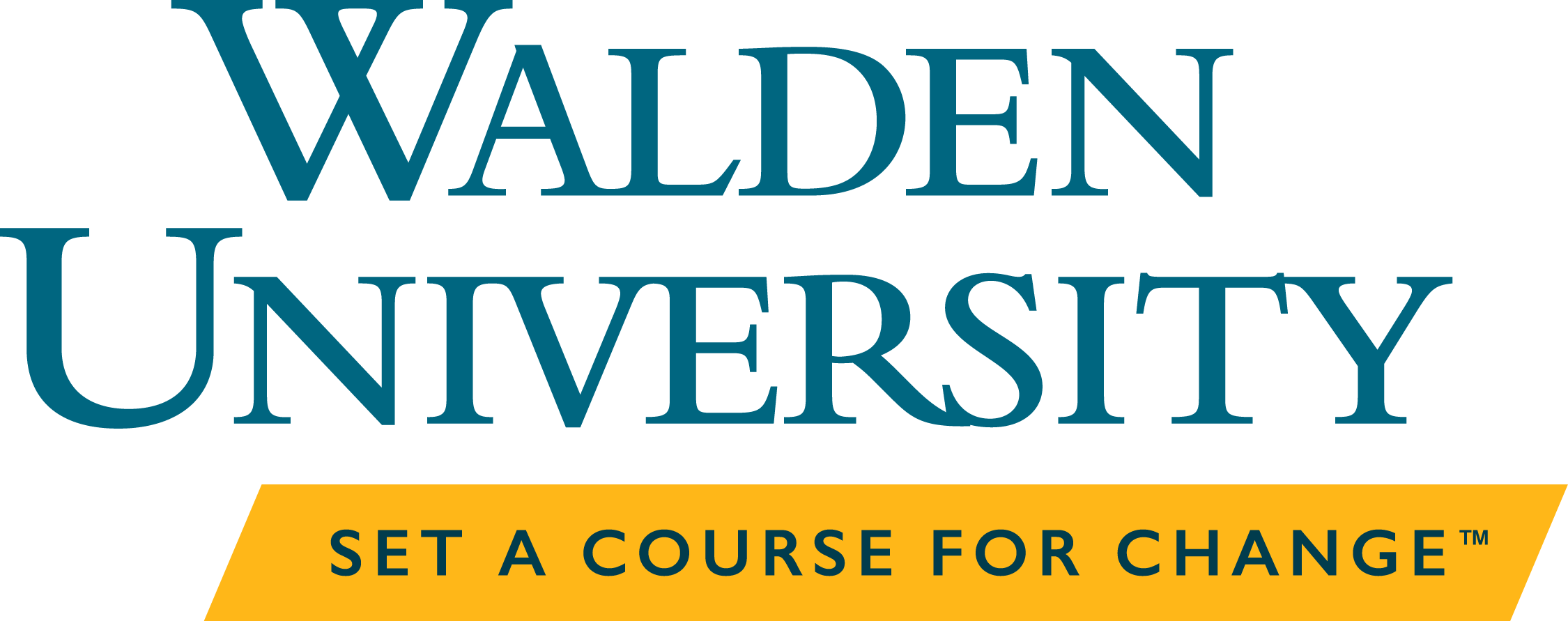 Walden University : MS in School Counseling (CACREP Accredited)
Walden University : MS in School Counseling (CACREP Accredited) Walden University : MS in Clinical Mental Health Counseling (CACREP Accredited, six specializations to choose from)
Walden University : MS in Clinical Mental Health Counseling (CACREP Accredited, six specializations to choose from)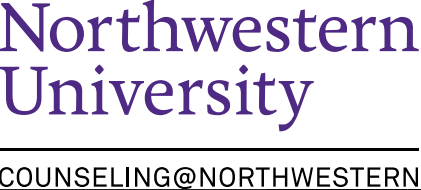 Northwestern University : Online MA in Counseling (CACREP Accredited)
Northwestern University : Online MA in Counseling (CACREP Accredited)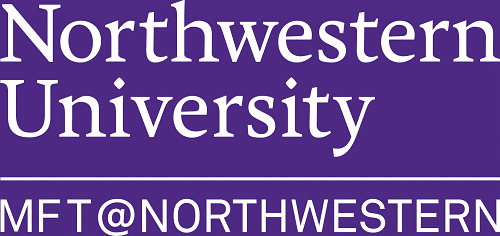 Northwestern University : Master of Science in Marriage and Family Therapy (Complete your COAMFTE-accredited MFT online program in as few as 21 months. No GRE required.)
Northwestern University : Master of Science in Marriage and Family Therapy (Complete your COAMFTE-accredited MFT online program in as few as 21 months. No GRE required.)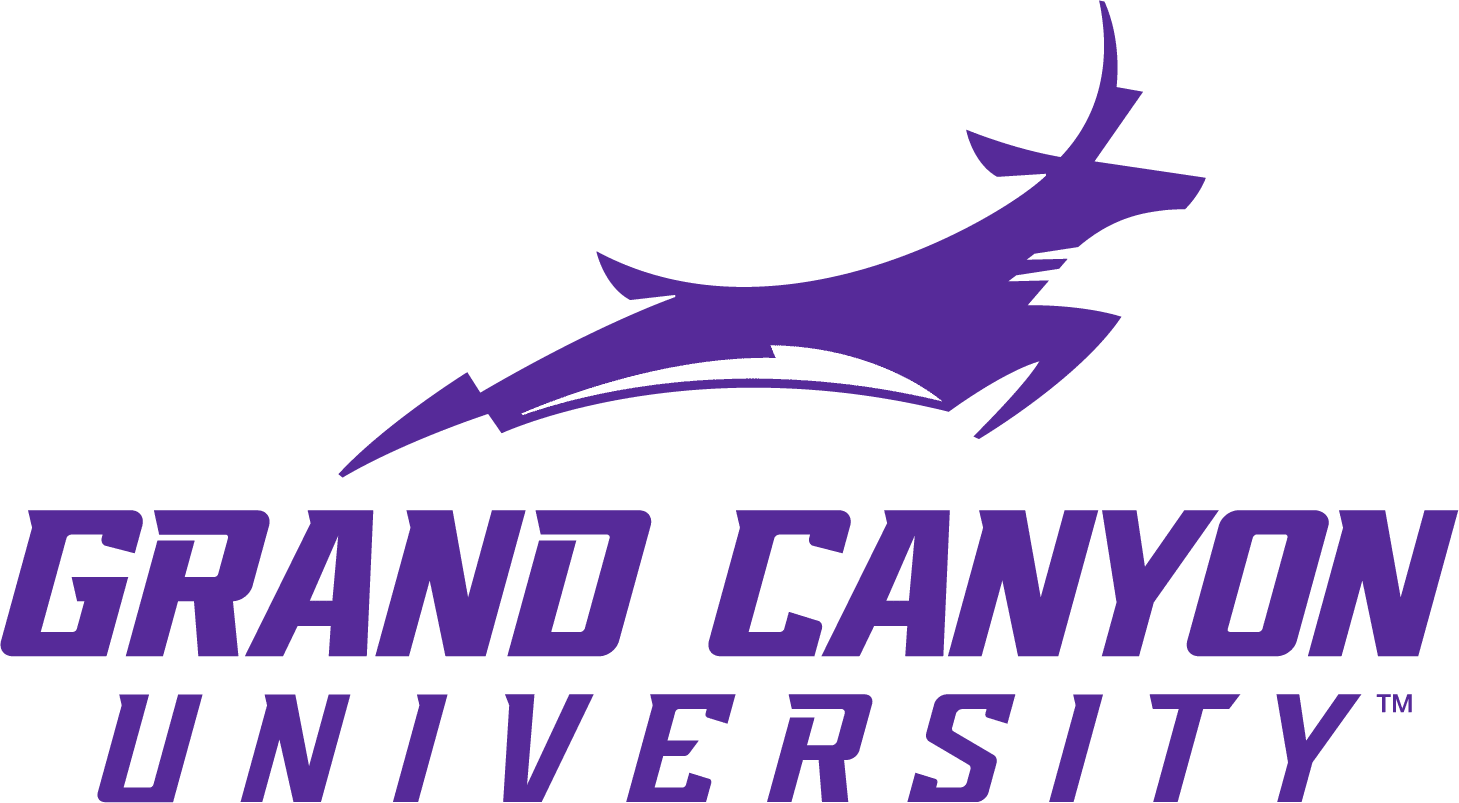 Grand Canyon University : Master's Degree in Counseling (As a private university, GCU has the same in-state and out-of-state tuition.)
Grand Canyon University : Master's Degree in Counseling (As a private university, GCU has the same in-state and out-of-state tuition.) Liberty University : MA: Clinical Mental Health Counseling (CACREP Accredited) (Online with required intensives)
Liberty University : MA: Clinical Mental Health Counseling (CACREP Accredited) (Online with required intensives) University of Denver : Master of Arts in School Counseling (No GRE required)
University of Denver : Master of Arts in School Counseling (No GRE required) The Chicago School : M.A. in Clinical Mental Health Counseling (Online Programs. CACREP Accredited.)
The Chicago School : M.A. in Clinical Mental Health Counseling (Online Programs. CACREP Accredited.) Mid-America Christian University (MACU) : Master of Science (MS) in Counseling (100% Online, No GRE Required)
Mid-America Christian University (MACU) : Master of Science (MS) in Counseling (100% Online, No GRE Required)What Kind of Degree Do I Need to Become a Rehabilitation Counselor?
To begin, an accredited bachelor's program can help shape your future in the field of rehabilitation counseling and case management, but a master's in rehabilitation counseling will likely be a requirement if you are considering a clinical counseling career.
Consider a Featured Online Counseling Program
| School and Program Information | Online Program? Entry Requirements |
Course Information |
|---|---|---|
| Walden University
MS in School Counseling
 CACREP Accredited CACREP Accredited |
✔ Online
GRE scores not required |
School counselors help students overcome obstacles and shape successful futures. Walden’s online MS in School Counseling program will give you a solid foundation in school counseling theories, approaches, and best practices while enabling you to gain hands-on experience. Learn More |
| Walden University
MS in Clinical Mental Health Counseling
 CACREP Accredited CACREP Accredited |
✔ Online
GRE scores not required |
Mental health counselors play a valuable role in helping people cope with life’s challenges. Walden’s online MS in Clinical Mental Health Counseling program can help you become the competent, compassionate counselor you know you can be. Learn More |
| Northwestern University
Online MA in Counseling
 CACREP Accredited CACREP Accredited |
✔ Online
GRE Not Required Bachelor's Required |
Prepare to pursue licensure in as few as 18 months Learn MoreFull-time, part-time, and accelerated track options available |
| Northwestern University
Master of Science in Marriage and Family Therapy
COAMFTE Accredited |
✔ Online
GRE Not Required Bachelor's Required |
The COAMFTE-accredited MFT@Northwestern is offered by The Family Institute at Northwestern University. Full-time students can complete the program in as few as 21 months. No GRE is required, but applicants must hold an undergraduate degree. Full and part-time tracks available. Learn More |
| Grand Canyon University
Master's Degree in Counseling
HLC and NASAC Accredited |
✔ Online
|
Clinical Mental Health Counseling master's degree emphases include: Childhood and Adolescence Disorders, Christian Counseling, Marriage and Family Therapy, and Trauma. Designed to meet the academic requirements of the National Board for Certified Counselors for the National Certified Counselor credential, the Certified Clinical Mental Health Counselor credential and the Arizona Board of Behavioral Health Examiners. As a private university, GCU has the same in-state and out-of-state tuition. Learn More |
| Liberty University
MA: Clinical Mental Health Counseling (CACREP Accredited)
 CACREP Accredited CACREP Accredited |
✔ Online
Online with required intensives |
Our CACREP-accredited master’s in counseling degree online can help you become an ethical, well-trained mental health counselor with the knowledge, values, and skills you need to empower others to make positive changes in their lives. Online and on campus. Training Champions for Christ since 1971. Learn More |
| University of Denver
Master of Arts in School Counseling
Designed to adhere to CACREP standards |
✔ Online
No GRE Required; Minimum GPA 2.5 Required |
Earn a Master’s degree in School Counseling online from the University of Denver. Learn from doctoral-level faculty in live classes and gain experience through mock counseling and in-field training. No GRE required. Complete in as few as 24 months. Learn More |
| The Chicago School
M.A. in Clinical Mental Health Counseling
 CACREP Accredited CACREP Accredited |
✔ Online
Bachelor's Degree Required. |
This online CMHC program prepares students for a career offering mental health services in a variety of settings; helping diverse clients through issues such as depression, anxiety, grief, low self-esteem, stress, relationship difficulties, and suicidal impulses. Learn More |
| Mid-America Christian University (MACU)
Master of Science (MS) in Counseling
Higher Learning Commission (HLC) |
✔ Online
100% Online |
Expand your impact with an online counseling degree rooted in faith-based practice. Mid-America Christian University offers the largest Master of Science (MS) in Counseling program in Oklahoma, with emphasis areas in addiction and substance abuse, applied behavioral science, clinical mental health counseling, and marriage and family therapy. Explore the online MS in Counseling at MACU. Learn More |
*Sponsored Counseling Programs
Online CACREP Accredited programs | Online MPCAC Accredited programs
Bachelors in Rehabilitation Counseling
Bachelor's programs in Counseling or Psychology are excellent choices on the path to becoming a certified rehabilitation counselor. They provide a foundation in brain science and cognitive ability, the different disabilities that require rehabilitation services, and disabilities’ causes, including genetic predisposition, injury or accident, or addiction and substance abuse.
Masters in Rehabilitation Counseling
In a master’s in rehabilitation counseling program, students engage in a more specific curriculum. This allows for a more focused approach in learning about the obstacles people with disabilities face and how you can help.
Master's degrees in Rehabilitation Counseling, Mental Health Counseling, Counseling, or Counseling Psychology are strong choices at this level, as they focus on methods of providing counseling services. These programs can also help students learn about the various ethical concerns, laws, and privacy issues that arise regularly in the field.
Traditional learning experiences offer those pursuing a master’s in rehabilitation counseling in-person coursework. For those who require the convenience and flexibility of remote learning, a master’s in rehabilitation counseling online is also available.
Doctoral Programs Focused on Rehabilitation Counseling
While most states require a minimum of an accredited master's degree in counseling for this career, pursuing a doctorate-level degree can help strengthen your abilities as a counselor and help you provide further expertise within the field.
Doctorate programs in Counseling and rehabilitation counseling provide a deeper look into the various disabilities that are common within society, the different treatment methods available to counseling professionals, and the research and development that is constantly taking place in the field.
 Walden University - MS in School Counseling (CACREP Accredited)
Walden University - MS in School Counseling (CACREP Accredited)
 Walden University - MS in Clinical Mental Health Counseling (CACREP Accredited)
Walden University - MS in Clinical Mental Health Counseling (CACREP Accredited)
 Northwestern University - Online MA in Counseling (CACREP Accredited)
Northwestern University - Online MA in Counseling (CACREP Accredited)
 Northwestern University - Master of Science in Marriage and Family Therapy (COAMFTE Accredited)
Northwestern University - Master of Science in Marriage and Family Therapy (COAMFTE Accredited)
 Grand Canyon University - Master's Degree in Counseling (NASAC Accredited)
Grand Canyon University - Master's Degree in Counseling (NASAC Accredited)
 Liberty University - MA: Clinical Mental Health Counseling (CACREP Accredited) (CACREP Accredited)
Liberty University - MA: Clinical Mental Health Counseling (CACREP Accredited) (CACREP Accredited)
 The Chicago School - M.A. in Clinical Mental Health Counseling (CACREP Accredited)
The Chicago School - M.A. in Clinical Mental Health Counseling (CACREP Accredited)
 Mid-America Christian University (MACU) - Master of Science (MS) in Counseling (Higher Learning Commission (HLC) Accredited)
Mid-America Christian University (MACU) - Master of Science (MS) in Counseling (Higher Learning Commission (HLC) Accredited)
What Are the Requirements for Different Rehabilitation Counselor Degrees?
Depending on the degree and focus you pursue, curricula will vary. This broad overview outlines the general higher education requirements for practicing in the field.
Bachelor’s in Counseling Degree Requirements
At the undergraduate level, students take a set of prerequisites that include algebra, history, arts, and other introductory courses. Once those prerequisites are complete, coursework progresses into more focused areas of counseling such as general psychology, individual counseling, clinical mental health counseling, school counseling, rehabilitation counseling, and family therapy.
Most bachelor’s degrees require 120 to 130 credit hours to complete, and a bachelor’s in counseling generally takes four years of full-time study, depending on the learning institution and your focus of study.
Master’s in Counseling Degree Requirements
After earning a bachelor’s, students can move on to graduate level coursework. Master’s program requirements include both independent study outside of the classroom and coursework that introduces various aspects of counseling. Some typical courses include Individual Counseling, Group Counseling, and Grief Therapy. Graduate school programs also typically include a practicum course and internships, allowing students to gain valuable clinical experience in a variety of work settings.
Students must have a good understanding of a range of physical, mental, and emotional disabilities, as well as of the origins and effects of these disorders. Also, students may be expected to take courses that outline the different counseling techniques and ethical issues associated with providing counseling services to the public. For example, students in counseling ethics courses will study the five principles of ethical reasoning: autonomy, justice, beneficence, nonmaleficence, and fidelity.
Students can pursue specialized majors such as school counseling, clinical and mental health counseling, or marriage and family counseling. Master’s in counseling programs offer several course options, depending on a student’s interest. Examples include Grief Therapy, Individual Counseling, and Group Counseling. Most master’s level programs consist of two to three years of graduate education.
View Masters in Counseling Degrees:
- Masters in Counseling
- Online Masters in Counseling
- Online Master of Arts in Counseling
- Online Masters in Counseling Psychology
- Masters in Mental Health Counseling
- Masters in School Counseling
- Online Masters in School Counseling
After earning a master’s in counseling, graduates take part in supervised work experience to qualify for licensure. Most rehabilitation agencies require that professionals be licensed prior to working with clients.
Doctorate in Counseling Degree Requirements
Doctorate programs involve a more refined look into rehabilitation counseling. Students may also take courses that help increase their research and analysis skills, which can contribute to a more thorough dissertation within the last year of the program. Doctorate level programs can assist learners with becoming more effective research and development specialists within their chosen field.
Students enrolled in doctoral programs may be required to complete 45 to 60 extra credit hours in addition to their master’s degree. Most programs require students to write a dissertation that introduces a new topic of scholarship to the field of rehabilitation counseling. A dissertation is an independent piece of research completed by the student under the supervision of a faculty member. Alternatively, the student may be required to complete a research project to get their PhD, which is generally smaller in scale.
PhD programs generally take three to four years. Courses at the doctoral level include Family Systems, Couples and Marital Therapy, and Qualitative and Ethnographic Research. Most PhD programs require that students have a master’s in counseling prior to enrolling.
View Doctorate of Counseling Programs
On-Campus or Online Rehabilitation Counselor Degree?
Showing up in person to class and learning with your fellow students used to be the norm, but with advancements in communication technology and innovations in digital classrooms, students now have options. When deciding how you’ll pursue your rehabilitation counselor degree, ask yourself which method best suits your schedule and ability to learn.
On-Campus Master’s Degree Programs in Rehabilitation Counseling
The on-campus learning experience has distinct advantages for those who prefer a hands-on approach. Not only will you receive face-to-face interaction with instructors, the traditional class model also provides opportunities for impromptu discussions and Q&A. Sometimes a student raising a hand and asking a simple question can lead to an enlightening discussion beyond the original lesson plan.
Another benefit of on-campus learning is access to instructors. Most educators are generous with their time, so it’s not uncommon for them to answer questions after class. Instructors also typically have office hours when students can ask about a recent lecture, a case study, or possible career paths.
Online Master’s Degree Programs in Rehabilitation Counseling
For students who require more flexibility, online coursework offers an ideal solution. Students with established careers or family obligations can learn from home without disrupting their routines. The main advantage of online learning is that it allows students to learn in an asynchronous environment at their own convenience. Online learning has become as engaging and comprehensive as the traditional in-person model, but without the need to travel to and from class.
An additional benefit is that online programs connect students with local agencies that allow them to work with clients under the supervision of a licensed professional counselor (LPC), which can lead to networking and even a path to a post-master’s career.
An online master’s in rehabilitation counseling is the quickest path to licensure for those interested in accelerated learning.
How to Become a Rehabilitation Counselor
To become a rehabilitation counselor, you must meet educational requirements set by licensing agencies. Those with a bachelor’s degree should be able to find entry-level employment as rehabilitation assistants, which is a reliable method of obtaining paid experience in the field.
In order to be fully licensed, you will be required to complete graduate-level coursework and earn a master’s degree. This will grant you access to participate in the supervised work experience required to qualify for licensure.
Rehabilitation Counseling Licensure
Licensure requirements vary by state, but most require a master’s degree, one and a half to two years of supervised work experience (around 3,000 hours), and a passing score on a licensing exam such as the National Counselor Examination. See our Counseling Licensure and State by State Counseling Licensure Information for more details.
Salaries and Job Growth for Rehabilitation Counselors
According to the U.S. Bureau of Labor Statistics (BLS):
- Rehabilitation Counselors, All Fields: $35,950 median annual salary in 2019, with 10% expected growth between 2019 and 2029
- Rehabilitation Counselors, State and Government: $51,260 median annual salary in 2019
- Rehabilitation Counselors, Individual and Family Services: $33,590 median annual salary in 2019
Rehabilitation Counselors, Community Vocational Rehabilitation Services: $32,310 median annual salary in 2019
Accreditation for Rehabilitation Psychology Graduate Degree Programs
The Council for Accreditation of Counseling & Related Educational Programs (CACREP) is a leading accreditation agency for educational programs in rehabilitation counseling. The organization provides educational standards to colleges and universities to better educate future counseling professionals.
When seeking out degree programs in rehabilitation counseling, it is vital that you ensure the quality of your degree program prior to enrolling. The accreditation process can assist you in finding reliable degree programs that are acceptable to licensing agencies and future employers. With the growth of online educational programs, it is important to always locate the CACREP’s seal of approval on any degree program that focuses on rehabilitation counseling.
List of Accredited Programs for Rehabilitation Counselors
Here are some of the most popular online counseling programs. On each page you will find a detailed write-up of the program, specific courses, and schools that are currently accepting applicants.
- Online Counseling Degrees
- Online Masters in Counseling
- Bachelor’s in Counseling
- Master’s in Counseling
- Counseling Schools by State
- Counseling Career Guide
- Highest Paid Counseling Jobs
Pursue Your Degree in Rehabilitation Counseling
A rehabilitation counseling degree puts you on the path to helping those in need, and can lead to a fulfilling, long-lasting career. Learn more about how Counseling Degrees Online can help you take the first step.

 University of Denver - Master of Arts in School Counseling
University of Denver - Master of Arts in School Counseling


